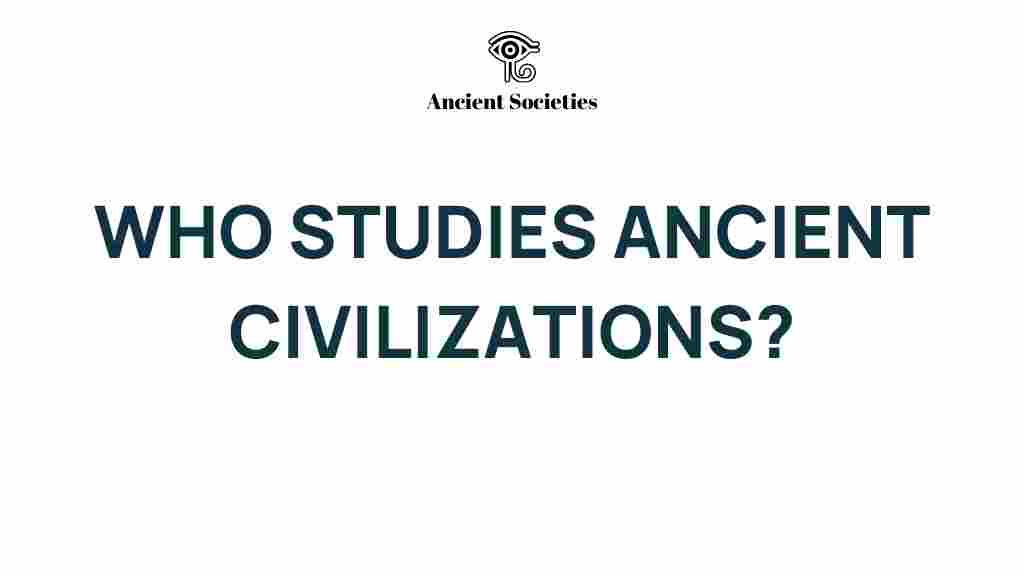Unveiling the Mysteries: Who Studies Ancient Civilizations?
Ancient civilizations have always captivated human imagination, serving as a testament to our cultural heritage and the complexities of human society. But who are the individuals dedicated to uncovering the stories and secrets of these lost societies? In this article, we will explore the various professionals who study ancient civilizations, focusing on their methodologies, the academic fields they represent, and the significance of their findings in understanding our past.
The Role of Archaeologists in Studying Ancient Civilizations
Archaeologists are the primary professionals who study ancient civilizations through the excavation and analysis of material remains. Their work is crucial for reconstructing the life and culture of societies that have long since vanished. Here are some key aspects of archaeology:
- Fieldwork: Archaeologists often spend months or years conducting fieldwork in various locations, digging sites that are believed to hold artifacts from ancient civilizations.
- Artifact Analysis: After excavation, archaeologists analyze artifacts—tools, pottery, and remnants of structures—to gain insights into the daily lives, economies, and social structures of past societies.
- Dating Techniques: They utilize various methods, such as carbon dating and stratigraphy, to date findings accurately and understand the timeline of ancient civilizations.
- Interdisciplinary Collaboration: Archaeologists frequently collaborate with historians, anthropologists, and other specialists to enrich their understanding of the cultural context behind their findings.
Historians and Ancient Civilizations
Historians play a vital role in the study of ancient civilizations by interpreting historical texts and records. Their work complements archaeology by providing context and narratives that artifacts alone cannot convey. Key contributions include:
- Textual Analysis: Historians analyze ancient manuscripts, inscriptions, and documents to extract information about political structures, religious beliefs, and social norms of ancient societies.
- Chronology Development: They develop chronological frameworks that help in understanding the progression of ancient civilizations and their interactions with one another.
- Contextual Understanding: Historians examine the influences of geography, economics, and cultures on ancient societies, providing a more comprehensive view.
An Anthropological Perspective
Anthropologists also contribute significantly to the study of ancient civilizations. They focus on the cultural aspects, examining how ancient peoples lived, interacted, and evolved over time. Here’s what anthropologists do:
- Cultural Practices: Anthropologists study the rituals, customs, and daily activities of ancient societies, helping to reconstruct their worldviews.
- Social Structures: They investigate the social hierarchies and relationships within ancient civilizations, shedding light on power dynamics and community organization.
- Ethnographic Comparisons: By comparing ancient societies with contemporary cultures, anthropologists can draw parallels and understand human behavior across time.
Research Methods in the Study of Ancient Civilizations
The study of ancient civilizations employs various research methods that integrate archaeological, historical, and anthropological approaches. Here are some common techniques:
- Excavation: The systematic digging of sites to uncover artifacts and structures.
- Surveying: Non-invasive techniques to locate and map archaeological sites.
- Remote Sensing: Technologies such as ground-penetrating radar help identify buried structures without excavation.
- Laboratory Analysis: Scientific analysis of materials, including pottery shards, bones, and organic remains.
- Historical Contextualization: Placing findings within broader historical narratives to understand their significance.
Challenges and Troubleshooting in the Field
Researchers studying ancient civilizations often encounter challenges that can complicate their work. Here are some common issues and troubleshooting tips:
- Site Preservation: Many archaeological sites are threatened by modern development. To mitigate this, researchers advocate for protective measures and engage in public outreach to raise awareness.
- Stakeholder Engagement: Collaborating with local communities is essential for successful excavations. Building relationships and respecting cultural heritage can lead to more fruitful research.
- Data Interpretation: Misinterpretations of artifacts can lead to flawed conclusions. Peer reviews and interdisciplinary collaboration help ensure accuracy.
- Funding Constraints: Research often relies on grants and donations. Diversifying funding sources and establishing strong proposals can help secure necessary resources.
The Importance of Cultural Heritage
Studying ancient civilizations is not only about uncovering the past; it is also crucial for preserving cultural heritage. Here’s why cultural heritage matters:
- Identity and Continuity: Understanding ancient civilizations helps communities maintain a connection to their history and identity.
- Tourism and Economy: Cultural heritage sites often attract tourists, contributing to local economies.
- Education and Awareness: The study of ancient civilizations educates the public about human history and encourages the preservation of cultural artifacts.
Conclusion: The Future of Research on Ancient Civilizations
The study of ancient civilizations is a dynamic field that draws on various disciplines, including archaeology, history, and anthropology. As researchers continue to uncover the mysteries of lost societies, they not only enrich our understanding of the past but also contribute to the preservation of cultural heritage for future generations.
Whether through excavation, textual analysis, or cultural studies, the quest to understand ancient civilizations is an ongoing academic exploration that holds the key to our shared human history. For more information on ancient civilizations and their significance, you can visit Archaeology Magazine.
To delve deeper into specific research methods and case studies, check out this detailed exploration of archaeological methodologies here.
This article is in the category Archaeology and created by AncientSocieties Team
